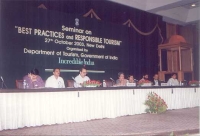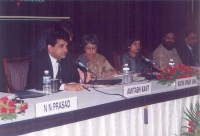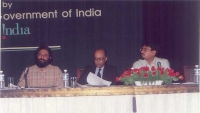Activities

Responsible Tourism and Necessity for a National Level Policy
A Report
23rd October, 2003
 The invitation for the workshop was received by my office through fax on the 15th and accordingly I had managed to send a rough heading under which I would make my presentation. Immediately after that I had to leave for Assam accompanying the “Fact Finding Tour” represented by Mr. Michael Bentley and Mr. Peter Jordan from the United Kingdom, the tour being sponsored by the Deptt. Of Tourism, Govt. of India. I have just returned and have sat down to prepare the presentation paper. I apologize to the organizers for the delay.
The invitation for the workshop was received by my office through fax on the 15th and accordingly I had managed to send a rough heading under which I would make my presentation. Immediately after that I had to leave for Assam accompanying the “Fact Finding Tour” represented by Mr. Michael Bentley and Mr. Peter Jordan from the United Kingdom, the tour being sponsored by the Deptt. Of Tourism, Govt. of India. I have just returned and have sat down to prepare the presentation paper. I apologize to the organizers for the delay.
 I represent a region which consists of everything between Marine to Alpine. It consists deep seeded cultural and natural heritage, the wonders of the living industrial archaeology and a wide diversity of experiencing the unexpected. This land has several religious and cultural ‘isms’ but there also exists a strong bonding between them. The proud local communities always have a open heart for the tourists, but as there are no policies to include them most of the destinations are turning into terrorist hubs. The two conflicting ‘isms’, tourism and terrorism are the only possibilities for this region which is sharing borders with five countries.
I represent a region which consists of everything between Marine to Alpine. It consists deep seeded cultural and natural heritage, the wonders of the living industrial archaeology and a wide diversity of experiencing the unexpected. This land has several religious and cultural ‘isms’ but there also exists a strong bonding between them. The proud local communities always have a open heart for the tourists, but as there are no policies to include them most of the destinations are turning into terrorist hubs. The two conflicting ‘isms’, tourism and terrorism are the only possibilities for this region which is sharing borders with five countries.
 Hence, I believe that the first and foremost policy for Responsible Tourism should confirm tourism activity by the local communities and for the benefit of the local communities. The organization that I belong to is Association for Conservation and Tourism which has developed and also identified several “Community Tourism” projects and in the process have come out with three different models:
Hence, I believe that the first and foremost policy for Responsible Tourism should confirm tourism activity by the local communities and for the benefit of the local communities. The organization that I belong to is Association for Conservation and Tourism which has developed and also identified several “Community Tourism” projects and in the process have come out with three different models:
1) Tourism entrepreneurship directly by the local communities-The local people have to be made aware of the tourism resources that they have and motivate them to organize it. First try to help them to develop a model or put up a demonstration model for them. The classic example for this is Pelling, Rishyap and Tinchulay villages. Other than the upliftment of the living standards of the villagers, this exercise has managed to bring back the several people who had left their homes to work outside.
2) Tourism entrepreneurship with the support of the local communities-Tourism in an area is organized by training and involving the local communities, and incorporating the local knowledge. It goes to an extent of sharing both knowledge and profit with the local communities. The classic example in this category is Wild Grass Resort in Kaziranga and the Sunderban Jungle Camp. When Assam was almost closed for the disturbances, Wild Grass had a steady flow of tourists.
3) Complimenting existing Industries-
The two major industries of this region is Timber and Tea, the former has died out because of global policies and the later is gradually aging. There is an existing major investment and infrastructure in these industries which can be utilized for tourism purposes. The best example for this is the Madora Woodcraft Industries rechristened to Garumara Jungle Camp and the tea garden Bunglow accommodation in Darjeeling, Dooars and Assam. The Garumara Jungle Camp has been able to bring back a few of the local employees and have trained them to provide tourism services.
The advantages of community tourism are several:
- People have greater amount of pride on what they possess.
- Best of everything is available in the simplest form.
- There is almost no damage to environment.
- Total indigenous experience and the absence of modernization is a virtue.
- There are no pressures of season and off-seasons, political disturbances etc.
- It improves the quality of life at the place of origin
 I strongly believe that responsible tourism confirms the most authentic local experience for the visitors which is genuine. The other day only probably the 17th of October on one of the floating restaurants on the Brahmaputra when I asked Peter about what made him come back to India time and again, he said even without thinking that it was the experience. The experience of the genuine hospitality of the Indians, their family bondings and their respect for other human beings which is completely absent in the west. So much so that he has been the co-author of a book on India ‘No Problem Sahib’ and brings the Darjeeling Himalayan Railway steam enthusiasts every year since 1997. He said that such experience was not possible through the regular tours that come from the west. This has been a common comment not only from the visitors from Europe and the US but also from our own countrymen who are from the cities.
I strongly believe that responsible tourism confirms the most authentic local experience for the visitors which is genuine. The other day only probably the 17th of October on one of the floating restaurants on the Brahmaputra when I asked Peter about what made him come back to India time and again, he said even without thinking that it was the experience. The experience of the genuine hospitality of the Indians, their family bondings and their respect for other human beings which is completely absent in the west. So much so that he has been the co-author of a book on India ‘No Problem Sahib’ and brings the Darjeeling Himalayan Railway steam enthusiasts every year since 1997. He said that such experience was not possible through the regular tours that come from the west. This has been a common comment not only from the visitors from Europe and the US but also from our own countrymen who are from the cities.
The major threats that we have had is the
Invasion of the conventional tourism and the absence of an appropriate framework for responsible tourism.
Most of the projects that we developed was based on motivation of the local communities and the synergy that was formed locally with the visitors has made destinations out of these villages and has increased tourism revenue of the area by two hundred percent in a period of three years.
Then there would be people from from the main stream tourism industry eyeing on the profits and look for lease or ownership of prime lands and properties in the area thus trying to make it profit models paying least attention to its setting, local knowledge and resource use or authentic experience.
There has been several workshops and seminars which has short listed the drawbacks of the conventional tourism practices but now the time has arrived when we should be able to make a framework for responsible tourism which can be implemented legally. This could only start with one or more laws for responsible tourism being made but it has to be done now or it will be never.
One and only principle that I would like today’s house to accept that
“appreciating objects of tourism interest should be declared as the Nation’s Common Property Resource”
The Responsible Tourism framework should be able to
- Cultivate partnerships,
- Enhance the diversity and
- Be able to develop livelihood linkages.
To be able to establish this framework we will have to
- Develop institutions which will impart knowledge and training to support the framework,
- Yearly audit and certification as per the framework and
- A dedicated promotion of the projects which follow the framework.
I on behalf of my organization would like to offer to take up the initiative to organize a workshop to frame a legal guideline for Responsible Tourism with the leadership of the Govt. of India, Deptt. Of Tourism. Even before that it is necessary to document the existing practices in the country which can influence in drawing the guidelines, we would be happy to take up this responsibility with the support of the Govt. of India, Deptt of Tourism.
Supratim(Raj)Basu
All rights reserved [actnowornever.org]. Best viewed with Google Chrome in 1024x768 pixels resolution.
Created & Cared by Techno Developers Group.